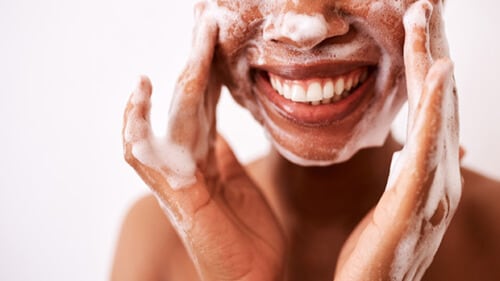Key points
- Washing your face regularly prevents disease.
- Use soap and clean, running water to remove dirt, oil, and more from your face.

Overview
Many diseases and conditions can be prevented or controlled through appropriate personal hygiene and by frequently washing the face. Appropriate facial hygiene practices include not only washing the face, but also properly caring for teeth, mouth, eyes, contact lenses, and ears.
Think before touching your face
Your hands can make your face dirty. Thinking before touching your face can help stop the spread of germs. On average, people touch their faces 23 times per hour. Unwashed hands can easily spread germs to your face after touching contaminated surfaces or objects.
Protect yourself by:
- Washing your hands at key times (such as before touching your face or putting in contact lenses)
- Using a tissue for your nose
- Using a tissue to scratch or rub your eyes or to adjust your glasses.
You can also prevent itchiness by using facial moisturizer for dry skin and eye drops for dry eyes.
Keep your face clean to help prevent some diseases
Respiratory illnesses can be caused by many different bacteria and viruses. Typically, respiratory infections like the common cold, flu, and COVID-19 can spread through droplets in the air when an infected person coughs or sneezes. They can also be spread by direct contact with bacteria, viruses, and other disease-causing germs. When you touch your face, the germs on your hands can enter your body through your nose, eyes, and mouth, making you sick. Protect yourself by washing your hands before touching your face and by washing your face regularly.
Pink eye (conjunctivitis) spreads easily from person to person. Good hygiene practices, such as handwashing, face washing, and not touching or rubbing eyes, are important for limiting the spread of pink eye.
